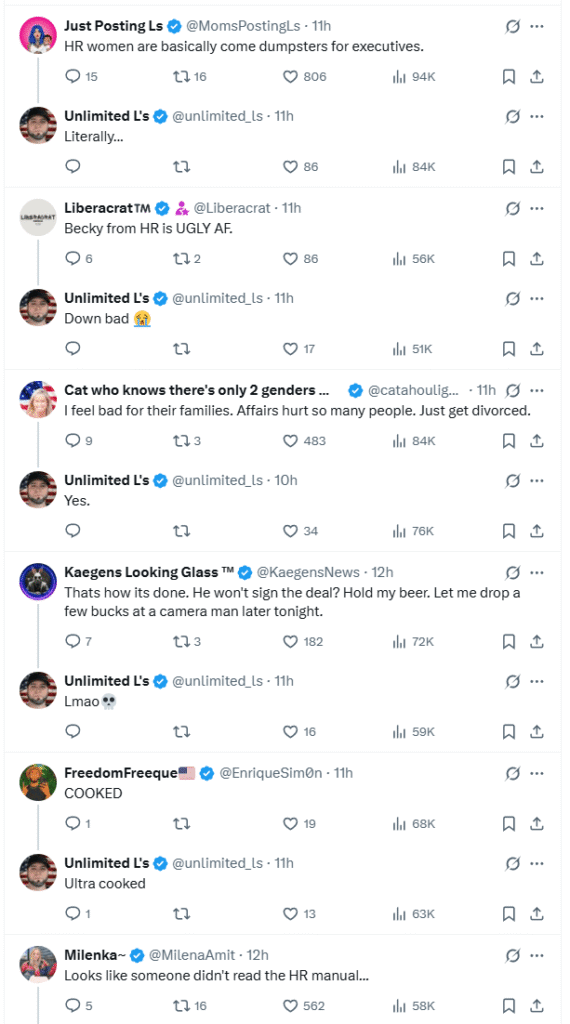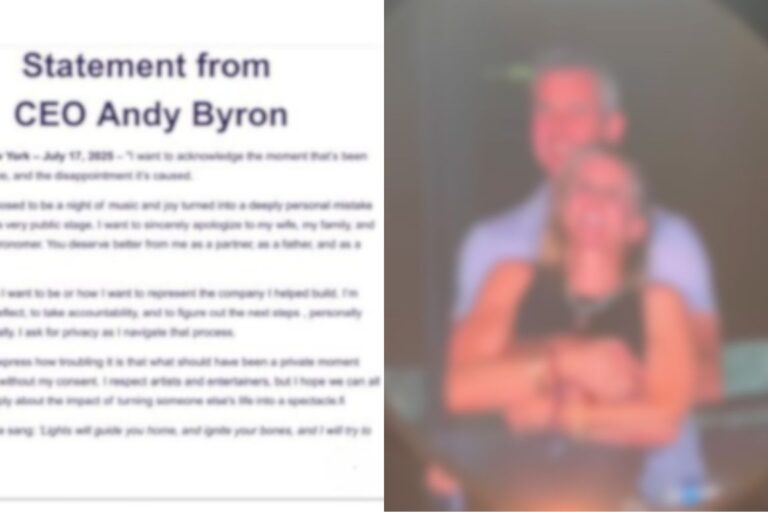There’s something about live music that makes people drop their guard. The lights dim, the bass thumps, and for a little while, you’re just a feeling. Not a job title, not a family role, not a burden of expectations – just a heart, pulsing in rhythm with the crowd.
And in one such moment – under the glow of Coldplay’s Fix You, no less – a couple appeared on the stadium’s kiss cam. But what should’ve been a lighthearted clip quickly turned into a wildfire of public scrutiny. That wasn’t just any couple.
That was Andy Byron, CEO of Astronomer, a well-known New York-based tech company, seen embracing Kristin Cabot, the firm’s own Human Resources Director.
The moment was brief, but revealing. As the camera zoomed in, Byron stepped out of frame, and Cabot turned her head, shielding her face.
Coldplay’s frontman, Chris Martin, even chimed in from the stage with a quip that only fueled the speculation: “Either they’re having an affair or they’re very shy.”
Coldplay's Chris Martin accidentally exposes astronomer CEO Andy Byron having an affair with his HR chief Kristin Cabot. pic.twitter.com/GMa2g0EiK3
— Pop Crave (@PopCrave) July 17, 2025
Within hours, the internet had identified both individuals. The word “affair” started trending. And while their marital statuses weren’t officially confirmed, online users were quick to assume that neither of them was supposed to be in that embrace.
Soon after, Byron released a public statement. A carefully written letter of apology acknowledging a “deeply personal mistake” and asking for space to reflect.
He ended the statement with a nod to the song lyrics that unknowingly framed the scandal: “Lights will guide you home, and ignite your bones, and I will try to fix you.”
But not everyone was moved.

One user wrote, “You went to a public concert with your mistress. Without your consent? Please.” Another snapped, “You think his wife will blame Coldplay like he did?”
So what actually happened here? Why do moments like these stir so much public emotion? And what can couples, especially those navigating long-term love, take away from a scandal like this?
Maybe it’s time we step back from the headlines, and look at the deeper story.
Why Good People Sometimes Lose Their Way
It’s easy to point fingers. But the truth is, not every story that ends up on the internet starts with malice. Sometimes, people who once promised each other forever find themselves wandering. Not because they stopped caring, but because they stopped feeling seen.
Moments like these are rarely about attraction alone. They’re about connection, timing, and the dangerous illusion that something new can heal something old.
Let’s be clear: stepping outside of a committed relationship doesn’t “just happen.” There are always choices.
But it’s also important to understand the emotional gaps that open up over time — when life gets too noisy, routines settle in, and partners start to feel more like roommates than soulmates.
In Byron’s case, we don’t know what led to that evening. We don’t know what was said in the weeks or months leading up to the concert.
But his public words reveal more than just a media strategy. “You deserve better from me as a partner, as a father, and as a leader.” That kind of admission doesn’t come from someone denying wrongdoing, it comes from someone facing the gravity of it.
NEW: Former Astronomer employee accuses CEO Andy Byron of being "toxic," says former employees are cracking up over the video, according to the New York Post.
— Collin Rugg (@CollinRugg) July 17, 2025
The married CEO was caught on the big screen with the company's HR chief at a Coldplay concert.
"The text groups and… pic.twitter.com/n5FMwINXhl
Still, what many people reacted to wasn’t only the relationship in question. It was the setting. This wasn’t a private mistake. It was a display in front of thousands.
The Coldplay stage, the camera pan, the collective gasp – it all made the moment feel cinematic, almost scripted. But the fallout wasn’t fiction.
Social media didn’t hold back. Some users mocked the apology, calling it “lame.” Others questioned the judgment of two senior executives displaying such intimacy in public.
“Wow, the audacity to criticize the cameraman,” one tweet said, reacting to Byron’s discomfort with the footage going viral.
And then there’s the added layer: power dynamics at work. With Byron as CEO and Cabot as the HR Director, their roles hold significant influence within the company.
While there’s no confirmation about the nature of their relationship beyond that embrace, public perception doesn’t wait for facts. It runs ahead, fueled by emotion, assumptions, and a culture that watches corporate leaders with a microscope.
This scandal isn’t just about love or betrayal. It’s about boundaries — emotional, professional, and relational — and what happens when they blur.
But instead of casting stones, what if we asked the harder question?
How do we get so far from the people we promised to stay close to?
That’s where the real work begins, not in a press release, not in a quote from a Coldplay song, but in the quiet, often uncomfortable places of our personal lives.
When Privacy Meets the Public Eye
One of the most controversial parts of Andy Byron’s statement was his frustration with the moment being captured without his consent. “What should have been a private moment became public without my consent…” he wrote.
But that’s the thing, it wasn’t private.
They were at a concert attended by tens of thousands, sitting close together in a VIP section, arms around each other, under the gaze of a stadium camera. In an age where everyone carries a lens in their pocket, the concept of privacy has changed. Especially when you hold a position of power.
Privacy isn’t just about where you are. It’s about what you choose to do there.
And while it’s true that no one deserves to be reduced to a viral video, it’s also true that public actions often carry public consequences.
Many of the reactions online weren’t just about the embrace, but about how the response felt out of touch. As one person tweeted: “You went to a public concert with your mistress. Without your consent? Please.”

This disconnect, between how we see our own actions, and how others perceive them, is something that many couples experience too, especially when communication breaks down.
You might believe your actions are harmless, even justifiable. But your partner may see them through a different lens entirely.
When One Moment Hurts Many
Every decision in a relationship carries weight. But when that relationship exists within a family, or within a team, that weight multiplies.
Byron’s apology acknowledged not just his wife and children, but also his colleagues. That matters. Because relationships don’t exist in isolation. They echo through bedrooms, boardrooms, and late-night phone calls with friends who saw it all online.
And let’s not forget Kristin Cabot,the HR Director seen in the video, who has remained silent as of this writing. Her role in the company is particularly sensitive.

She’s someone employees would normally turn to when facing uncomfortable issues at work. The nature of her relationship with the CEO, regardless of personal context, now casts a long shadow over that trust.
When personal boundaries blur within professional spaces, trust erodes quietly but deeply.
That’s not to say two consenting adults can’t form genuine connections, even at work. But transparency matters.
So does timing. So does respect for the people who didn’t choose to be part of your story — like a spouse, a child, or a co-worker who now feels disoriented by what they’ve learned secondhand.
What Does a Real Apology Look Like?
Let’s take a moment to talk about apologies — not as PR tools, but as emotional lifelines.
A good apology doesn’t erase the past. It acknowledges it. It doesn’t shift blame to circumstance, timing, or technology. It owns what happened, and expresses a desire to repair what can be repaired.
Byron did use the language of accountability: “You deserve better from me…” He didn’t deflect entirely, and he didn’t lash out.
But still, many felt something was missing, a deeper sense of remorse, perhaps, or more clarity about what would change going forward.
Because saying “I’m sorry” is only the beginning. What follows matters more: Does the behavior stop? Does the communication improve? Do the priorities realign?
In long-term relationships, especially marriages, apologies aren’t about perfect words. They’re about imperfect efforts to reconnect, efforts that are consistent, honest, and willing to be uncomfortable.
For Those Watching: What Can We Learn?
If you’ve been following this story from the sidelines, not with judgment, but with reflection, maybe it’s brought up some feelings of your own.
Maybe you’ve seen your partner withdraw lately. Or maybe you have felt that itch of restlessness you’re afraid to say out loud.
This might be the right moment to gently ask yourself:
- Are we nurturing our connection, or just maintaining our routine?
- Are we being emotionally generous, or emotionally efficient?
These aren’t questions with instant answers. But they’re worth asking. Because the truth is, most relationships don’t fracture from one big betrayal, they erode slowly, through unspoken disappointments and growing distances.
You don’t have to wait for a scandal, or a statement, to recalibrate. You just need a conversation. One that begins not with blame, but with curiosity:
- “How are we, really?”
- “What do you miss about us?”
- “What can we do differently — together?”
Final Notes
Andy Byron ended his statement with a lyric from Coldplay:
“Lights will guide you home, and ignite your bones, and I will try to fix you.”
It was meant to be poetic. But perhaps unintentionally, it captured something honest: the longing to return, not just to a physical home, but to an emotional one.
The truth is, fixing something doesn’t mean restoring it to what it was. Sometimes it means rebuilding something new, together, with the lessons etched into its foundation.
Whether you’re the one who drifted, or the one who stayed, know this:
Love doesn’t survive because people never mess up. It survives when people learn how to repair with care.
So maybe the real lesson from that stadium moment isn’t about scandal. It’s about the quiet courage it takes to show up again — to own what was broken, and to be part of what’s rebuilt.


